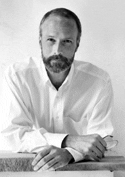Japanese acupuncture for depression
by Bart Walton, M.Ac., L.Ac.
This article was originally published in June 2003

(June 2003) — Acupuncture is rapidly becoming a common alternative therapy for various physical disorders. But many people may not realize that acupuncture also has a long history in the treatment of mental and emotional disorders. For mild to moderate depression, bi-polar disorder or seasonal affective disorder (SAD), acupuncture can be very effective as an alternative to drug treatment, or as a supporting therapy.
In the United States, depression is by far the most common of the various mental and emotional disorders. From the perspective of the traditional medicine of Asia, depression is a form of fatigue, i.e., the life-energy of the body is either deficient or not being distributed evenly throughout the body. The result is a subjective experience of lifelessness, fatigue, lack of motivation, emptiness and even despair.
In this system of medicine, the lungs and the organs of digestion are considered the most important organs involved in the generation and distribution of life-energy. Therefore, in the treatment of depression, Japanese acupuncture will look first to the lungs and the organs of digestion in order to locate the underlying pattern of imbalance. By strengthening the flow of energy in these two organ systems, symptoms associated with mild to moderate depression can often be resolved quickly.
It’s interesting to compare this ancient perspective with western medical science, which views depression as a deficiency or imbalance in brain chemistry. According to western medicine, one of the most important chemicals supporting our mental and emotional well-being is the neuro-transmitter, serotonin.
The importance of serotonin in depression is underscored by the fact that most anti-depression drugs are primarily designed to increase the concentration of serotonin in the brain. Even more interesting, researchers have found that a significant percentage of the body’s available serotonin (some say as much as 80 percent) is produced in the gastrointestinal tract as a by-product of digestion.
Another common characteristic of depression is fatigue which, from a western perspective, is both a function of efficient digestion and respiration. So, perhaps the ancient physicians of Asia were right in their assessment that depression is a form of fatigue and that the channels related to the lungs and the organs of digestion are somehow at the root of the problem. Centuries later, this perspective is very consistent with the findings of modern western science.
In Japanese-style acupuncture, we first perform what is called the “root treatment.” That is, we locate and treat the weakest energy channel in order to correct the underlying pattern of imbalance. The tools of our examination are our senses. We look at the patients’ facial expressions; the way they walk and carry themselves; we palpate the abdomen; listen to the quality of the voice; feel the texture, moisture and temperature of the skin, nails and hair; and we feel the pulses.
From these examinations, we are able to determine the underlying imbalance and take steps to correct it. The purpose of this “root treatment” is to restore a balanced flow of energy throughout the body over the long term.
In addition, if the patient is experiencing fatigue, despair, lack of motivation, loss of appetite, insomnia, or any other particular symptoms of depression, there are specific techniques which help to remove the symptoms and restore more normal functioning. In particular, Japanese-style acupuncture uses very superficial and light-touch needling techniques, which have evolved over centuries in order to increase the patient’s energy and lift the spirits.
Sometimes, several treatments are needed. But for the most part, these methods do work to give the patient some immediate relief until the root treatment can begin to take effect. Both the root and the symptomatic treatments are important in order to maximize the overall effect.
In the traditional medicine of Asia, there are many theories of psychological or emotional imbalance. It would take several volumes to cover this subject thoroughly. But in clinical practice, we have to ask the fundamental question: where is the energy flow weak? By strengthening the weakest energy channel, Japanese-style acupuncture can have a very positive therapeutic effect in cases of mild to moderate depression.And often, the patient’s emotional balance and sense of well-being can improve dramatically in a matter of weeks.
Bart Walton, M.Ac, is a Washington State-licensed acupuncturist with a private practice in the Green Lake area of Seattle. He has a master of acupuncture degree from Northwest Institute of Acupuncture and Oriental Medicine and specializes in Japanese-style acupuncture and moxibustion. Over the last 20 years, Walton has traveled extensively in Asia, studying the use of herbs, diet and lifestyle in traditional medicine. He may be contacted at 206-527-9672 or bartonwa@hotmail.com
